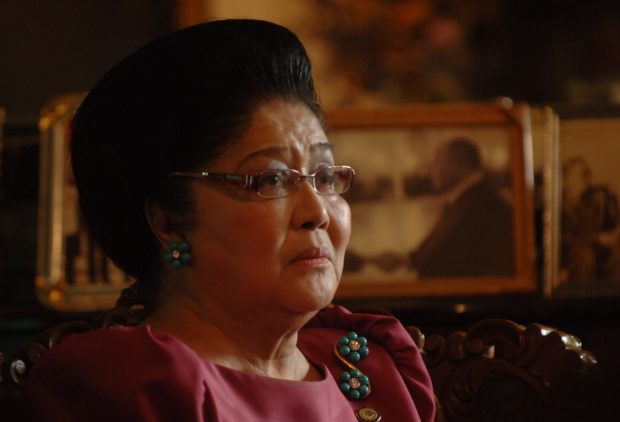Various groups debate issue: Should Imelda Marcos be detained?

NATION DIVIDED Human rights lawyer Chel Diokno says Imelda Marcos should serve jail time for her crimes, but Quezon Rep. Danilo Suarez insists placing an octogenarian behind bars would do the country no good.
Should former first lady Imelda Marcos be detained after she was convicted last week of graft?
The Movement Against Tyranny-Southern Tagalog said that a warrant should be issued for the arrest of the wife of the late dictator Ferdinand Marcos and that she should not be granted bail.
Despite her age, Imelda, an Ilocos Norte representative, must be detained, according to a human rights lawyer.
But placing Imelda, an octogenarian, behind bars would do the country no good, according to House Deputy Minority Leader Danilo Suarez.
Suarez, a Quezon representative, said the proposals to exempt Imelda from serving the 77-year jail term handed down by the antigraft court Sandiganbayan were reasonable considering her age.
Article continues after this advertisementArrest warrant
Article continues after this advertisement“For us to have closure, don’t make this a big issue,” Suarez told reporters. “If you have her arrested, the issue will only become bigger.”
Activists in Southern Luzon have asked the court to issue an arrest warrant for Imelda, who was convicted last week of graft for a case filed 27 years ago.
Lawyer Monnie Nolasco, spokesperson for the Movement Against Tyranny-Southern Tagalog, said on Monday that Imelda should submit herself to court proceedings.
He said Imelda could file a petition for bail after the Sandiganbayan found her guilty of channeling government funds to her family’s personal bank accounts abroad.
“But she shouldn’t be granted [bail]. Why should she? She did not even attend the promulgation, showing no respect at all to the court,” the lawyer said in a phone interview.
Imelda was reported to have attended the birthday party of her daughter, Ilocos Norte Gov. Imee Marcos, the very night the conviction ruling came out.
Swiss foundations
The Sandiganbayan ruled that she was guilty in seven of the 10 graft cases filed against her in connection with Swiss foundations she and her husband used to stash $200 million abroad.
Imelda was sentenced to serve six to 11 years in prison for each count.
Her conviction can be appealed.
Dwight Diestro, chair of the University of the Philippines Los Baños Department of Social Sciences, said Marcos’ conviction showed that the Philippine justice system “works, albeit slow.”
Jail time
Diestro said the ruling was a “sufficient start to reread [the book] ‘Conjugal Dictatorship’” in Philippine history.
Human rights lawyer Chel Diokno said Imelda should serve jail time for her crimes.
Diokno said Imelda’s age “should not be an obstacle to accountability,” adding that the 89-year-old should be imprisoned because she did not commit the crime when she was 89 years old but during her 50s.
“There should be jail time, I believe, because the people have to see that anyone can be held accountable whether they’re rich or poor,” Diokno said on ABS-CBN News Channel.
In the House of Representatives, Suarez said critics of the late dictator had done nothing but look for the wrong that Marcos had done.
“How about the good things they [Marcoses] had done?” the lawmaker said.
Suarez said the country would not move on if people would dig up the past.
Appeal
Imelda will appeal her conviction.
Manuel Lazaro, head of the Office of the Government Corporate Counsel from February 1976 to February 1986, has formally taken on the role of pursuing the appeal of Imelda.
M. M. Lazaro and Associates submitted an entry of appearance on Monday, one working day after Marcos and her former lawyer, Robert A. C. Sison, failed to appear before the Sandiganbayan Fifth Division during the Friday promulgation of its verdict.
Philippine National Police Director General Oscar Albayalde said Imelda’s advanced age was the reason the PNP was not shadowing her when an arrest warrant for her was expected to be out soon.
The PNP has been drawing flak online for the contrast between its response to Imelda’s graft conviction and how it quickly stood at the ready to arrest Sen. Antonio Trillanes IV even without a warrant when his amnesty was revoked in September. —With reports from Marlon Ramos and Daphne Galvez